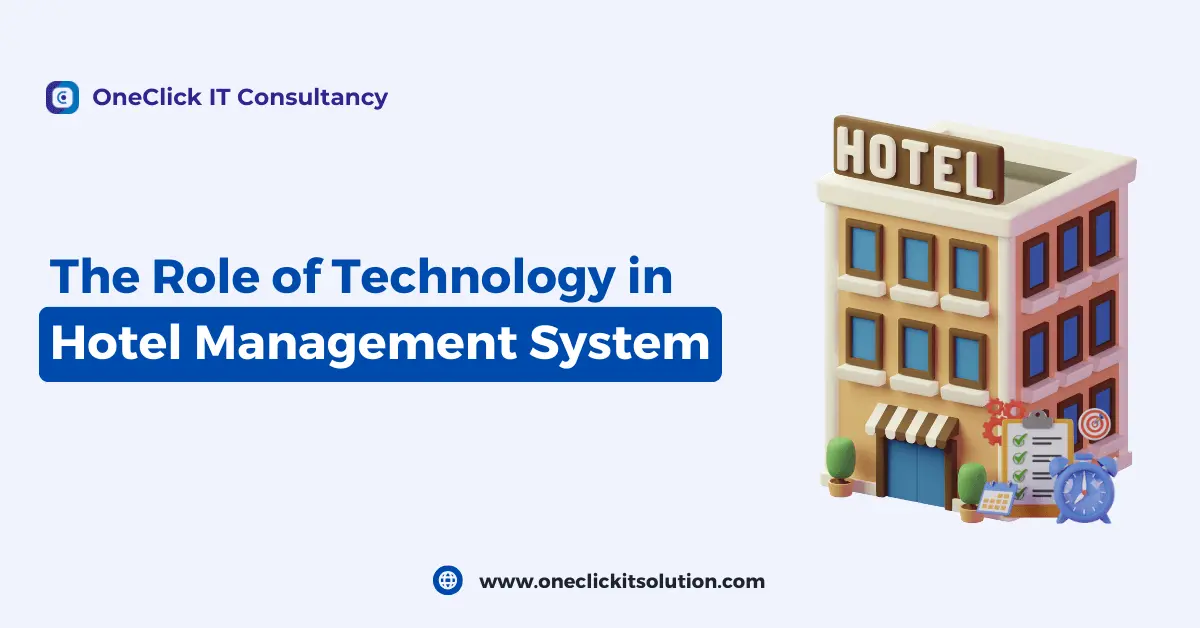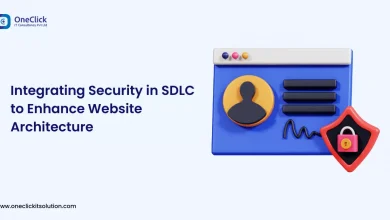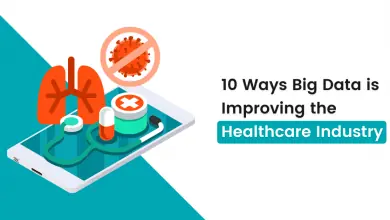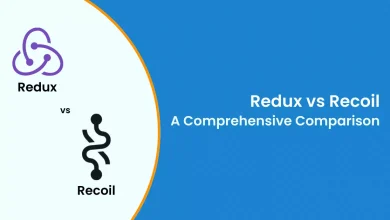From Check-In to Check-Out: The Role of Technology in Hotel Management System

Have you ever wondered how technology revolutionizes every dealing in the hotel management system? Hotels grapple with many operational responsibilities, employing different software solutions for specific functions and adhering to traditional hotel management methods.
This blog post explores technology’s role in hotel management systems. Let’s dive right into the profound impact and strategic integration of technology in hotel management.
What Does Hotel Management System Mean?
Hotel Management System (HMS) is a specialized hospitality software designed to streamline business operations and enhance the guest experience. This comprehensive software facilitates efficient reservations, staff, inventory, and billing management, consolidating all essential functions into one centralized platform.
The versatility of end-to-end hotel management software extends further by allowing seamless integration with third-party applications, including online hotel booking management software and payment gateways. This integration ensures that reservation notifications from any booking platform are seamlessly routed into the unified hotel management system, providing a cohesive and organized approach to handling reservations.
The Significance of Technology in the Hotel Management Sector
In the hotel industry, technology integration is steered by three primary objectives: adapting to evolving guest expectations, enhancing operational efficiency, and delivering a more personalized and seamless guest experience.
In today’s landscape, guests exhibit heightened technological acumen, anticipating convenience, speed, and simplicity in every interaction. How can your hotel align with these expectations? The answer lies in leveraging technology.
The infusion of technology significantly amplifies operational efficiency. Manual errors dwindle, service speed accelerates, and hotels can adeptly manage larger guest volumes without compromising service quality. Just as one would use a calculator for precise calculations rather than relying on manual methods, technology minimizes human errors, optimizing overall accuracy.
A technologically empowered hotel transforms into a finely tuned mechanism, refining workflow and liberating staff resources to concentrate on other facets of the guest experience.
Technology opens the door to a more personalized guest experience. Data analytics and artificial intelligence (AI) furnish profound insights into guest preferences, empowering hotels to customize services to individual needs and elevate the overall guest experience.
Incorporating a certain level of technology into every hotel’s operations is imperative to staying relevant and enticing guests for repeated stays.

Exploring the Variety of Hotel Management Software
Are you interested in hotel management software development and you are looking to explore the various top hotel management software? This is it!
To streamline your hotel project management processes effectively, opting for a comprehensive solution with modular flexibility is crucial. The ability to construct individual modules and integrate them seamlessly offers unparalleled convenience. Set aside the conventional approach and explore the various hotel management software that can be developed:
Hotel Property Management System (PMS)
This is an indispensable category of software for hotel management, essential for every hotel business. The Hotel Property Management System oversees front-desk management, housekeeping, accounting, reporting, and other crucial functions.
Central Reservation System (CRS)
One of the best hotel management software is the central reservation system. It is an integrated system designed to facilitate real-time management of hotel tasks such as inventory distribution, rates, reservations, and more. Serving as a central hub, the CRS collects data from various systems, including PMS, global distribution systems, and internet booking registries, providing a unified perspective of hotel data through a single pane of glass.
Hotel Staff Management System
Reflecting the organizational structure of the hospitality business, the Hotel Staff Management System addresses the challenges of overseeing diverse teams handling specific tasks, from the reception area to room service and kitchen operations. This software becomes an invaluable tool for large hotel entities with substantial staff, enabling seamless management through features like HRA, daily reporting, task assignments, and more.
Online Hotel Booking Engine
An Online Hotel Booking Engine serves as the platform enabling hoteliers to showcase their establishments and secure reservations seamlessly.
Research indicates that travelers searching for hotel accommodations encounter approximately 38 sites, a significant portion being online hotel booking engines. These platforms play a crucial role by charging both hotels and guests platform service fees and commissions for the successful completion of each deal.
Revenue Management System (RMS)
Revenue Management System proves invaluable for hotels seeking to maximize business and revenue during optimal periods. Essentially, an RMS aids hotels in optimizing pricing strategies and other revenue streams based on market demand.
An RMS incorporates robust data analytics features, offering insights into online visitor behavior, booking patterns, and various parameters. Leveraging this analytical prowess, hotels can formulate business strategies to present enticing deals to potential guests.
Housekeeping Management Software
Whether developed as a standalone app or integrated as a module within a Hotel Management System (HMS), housekeeping management software emerges as a practical solution. This tool proves indispensable for the housekeeping and room service team, facilitating the seamless assignment and scheduling of cleaning tasks. Its capabilities contribute to maintaining elevated levels of cleanliness and hygiene throughout the hotel.
Hotel Customer Relationship Management (CRM) System
In business and client relationships, CRM software is an essential tool. For expansive hotel chains like Marriott and Hyatt, integrating CRM software is imperative to establish connections with guests and encourage them to choose the hotel for future trips.
CRM is a cloud-based hotel management software solution that meticulously tracks guest data, including reservation history and travel preferences. Leveraging this information, hotels can execute targeted marketing strategies and deliver personalized experiences through hotel-specific apps.
Hotel Inventory Management Software
Managing hotel supplies is crucial to providing an exceptional guest experience in hospitality. Hotel inventory management software proves invaluable, offering comprehensive inventory tracking, ranging from kitchen supplies to room essentials, including bathroom and cleaning necessities. This system ensures meticulous control over hotel inventory, optimizing operational efficiency.
Hotel Tour Assistance Software
A hotel tour assistance or guiding feature within a dedicated app becomes essential for expansive hotels with intricate layouts and numerous attractions. By incorporating AR/VR or metaverse technology, hotels can launch immersive tour experience apps, allowing guests to explore the hotel virtually or in person.
Selecting the Right Features for Your Hotel Management System
Building a robust hotel management software doesn’t mean adding many features; it’s about integrating the right functionalities to enhance hotel operations. Let’s explore some essential hotel management software features: you need to consider in hotel management.
1. Reservation Management:
Centralized reservation systems are crucial for effective hotel booking management. This feature enables hoteliers to track reservations from various platforms, manage bookings, modifications, and cancellations, and efficiently handle room assignments.
2. Front Desk Management:
Following reservation confirmation, the focus shifts to the reception team—the face of the hotel. A comprehensive hotel management system should facilitate streamlined check-ins and check-outs, guest profiling, room key management, and efficient room allocation.
3. Back Office Management:
Efficient staff management is a cornerstone of hotel operations, and the back office management feature plays a pivotal role in achieving this. It allows you to monitor staff activities, track assigned tasks, and manage break times, leaves, attendance, and overall staff efficiency.
4. Billing and Invoicing Excellence
Managing many guests demands a modern approach to billing and invoicing, steering clear of cumbersome traditional register practices. To streamline this process, your hotel management software should feature automatic billing and invoice generation, eliminating the complexities associated with noting down extra services availed by guests manually.
5. Reporting and Analytics Advancements
While traditional hotel management practices yield substantial data, the true power lies in advanced analytics and reporting features, enriched by the capabilities of AI/ML technologies. An indispensable part of your hotel management software, this feature empowers you to harness real-time insights on revenue and various hotel departments.
6. Extra Service Monitoring for Enhanced Guest Experiences
Many hotels offer a myriad of activities and services on their premises, ranging from cafes, bars, and restaurants to swimming pools, gyms, and spa centers. Guests often seek to experience these additional services, either chargeable or complimentary.
Implementing a system to monitor these extra services is crucial for tracking guest preferences and understanding their contribution to increased profits. By analyzing data on activities and services availed by guests, you can identify popular choices and manage rush periods for specific services or activities. This information is instrumental in optimizing occupied areas and enhancing the overall guest experience.
7. Fortifying Security and Access Controls
In hotel management software, safeguarding your and guests’ data is paramount. To mitigate the risk of potential breaches by hackers, prioritize integrating robust security measures and access controls during development. Implement multi-factor authentication and hierarchy-based accessibility to fortify your system’s defenses.
Digital Transformations Shaping the Hospitality Landscape
The hospitality industry is undergoing a profound evolution with the integration of digital technology, enhancing guest experiences and operational efficiency. From online hotel management system to mobile check-in and check-out, digital innovations are reshaping how hospitality services are delivered. Here are some prominent digital technologies that significantly impact the hospitality sector:
1. Artificial Intelligence (AI) and Chatbots
AI and chatbots have revolutionized customer service in the hospitality industry. These technologies automate interactions, offering personalized support and quick responses to frequently asked questions. AI-driven chatbots enhance the guest experience by providing tailored assistance, and predictive analytics enable businesses to anticipate and meet customer needs effectively.
2. Automated Kitchen Systems
In restaurants, automated kitchen systems streamline food preparation processes, increasing efficiency and ensuring quality control. Chefs benefit from features like automated ingredient ordering, precise cooking time and temperature settings, and production tracking. These systems reduce waste, enhance quality, and expedite service, improving kitchen operation.
3. Automated Hotel Room Service
Automating the hotel room management system transforms the guest experience. It allows guests to securely access menus, place orders, and pay from their devices.
The automated process provides a personalized dining experience, allowing guests to customize orders based on dietary preferences. Not only does this technology improve customer satisfaction, but it also streamlines the room service process, saving time and labor costs.
4. Customer Relationship Management (CRM) Software
CRM software is vital for managing customer relationships and communications in the hospitality industry. Businesses can gain valuable insights into guests by tracking customer data, including contact details, preferences, and purchase history. This information enables the delivery of personalized experiences and facilitates the creation of targeted marketing campaigns, attracting and retaining a more satisfied customer base.
5. Digital Signage
Digital signage is a dynamic platform for hotels and restaurants to convey real-time information, such as menus, specials, offers, and promotional announcements. This technology enhances guest experience by providing interactive and easily accessible information, eliminating the need to navigate through physical menus or seek assistance from staff. Additionally, digital signage is a versatile medium for displaying promotions, ads, and visuals, contributing to increased brand awareness and recognition.
6. Point of Sale (POS) Systems
POS systems that stand as a cornerstone in the digital toolkit of the hospitality industry. Widely adopted in restaurants and hotels, these systems facilitate swift and accurate processing of orders, inventory tracking, and providing precise billing information to customers. POS systems are crucial in minimizing human errors and enhancing operational efficiency by streamlining order processing, payment transactions, and overall management tasks.
7. Voice Ordering
Voice ordering technology revolutionizes the dining experience by enabling customers to place orders through a restaurant’s voice-activated menu. This innovative concept simplifies the ordering process, enhancing speed and convenience for customers. By eliminating written menus, patrons can effortlessly voice their preferences, reducing wait times at busy restaurants and providing a streamlined ordering solution.
8. Virtual and Augmented Reality (AR/VR)
Virtual and Augmented Reality technologies immerse customers in more engaging experiences. Restaurants can leverage AR/VR to showcase meal visuals before customers place their orders, while hotels can offer virtual tours of rooms and amenities. These technologies enhance customer engagement, providing entertainment and educational activities, such as virtual cooking classes or immersive tours, resulting in a more personalized and captivating experience.

9. Mobile Payment Systems
Mobile payment systems revolutionize the payment landscape in hospitality. Offering convenience, these systems eliminate the need for cash or physical cards, enabling secure and fast transactions through smartphones or other mobile devices. Contactless payments enhance the overall customer experience, providing a seamless and efficient payment process.
10. Mobile Check-In and Check-Out
Mobile check-in and check-out tools are pivotal in the hospitality industry, enabling guests to seamlessly manage their hotel stays via smartphones or other mobile devices. Guests can access reservation details, streamline their experience, and enjoy a stress-free process. This technology enhances customer service and streamlines operations, reducing costs associated with traditional check-in/check-out procedures.
Bottom Line
The integration of technology into the hotel management system has undeniably transformed all that has to do with hospitality. From enhancing guest experiences with features like mobile check-ins and virtual concierge services to streamlining operational processes through AI-driven solutions, technology plays a pivotal role in optimizing efficiency and delivering personalized services.
For hoteliers looking to elevate their establishments and cater to the tech-savvy demands of modern travelers, now is the time to explore, adopt, and integrate advanced technology into their hotel management systems. Whether it’s implementing AI-driven chatbots for seamless customer service, leveraging digital signage for dynamic communication, or incorporating mobile payment systems for enhanced convenience, the potential for innovation is vast.





